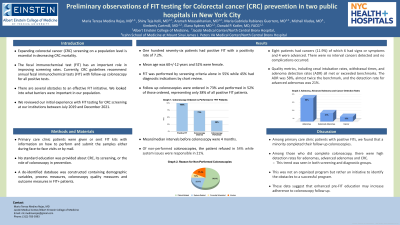Back


Poster Session A - Sunday Afternoon
Category: Colorectal Cancer Prevention
A0173 - Preliminary Observations of FIT Testing for Colorectal Cancer (CRC) Prevention in Two Public Hospitals in New York City
Sunday, October 23, 2022
5:00 PM – 7:00 PM ET
Location: Crown Ballroom

Has Audio

Maria Teresa Medina Rojas, MD
Jacobi Medical Center
New York, NY
Presenting Author(s)
Maria Teresa Medina Rojas, MD1, Arameh Mousakhanian, MD2, Shiny Teja Kolli, MD2, Michail Kladas, MD2, Maria Gabriela Rubianes Guerrero, MD1, Kimberly Cartmill, MD1, Elana Sydney, MD1, Donald P. Kotler, MD1
1Jacobi Medical Center, Bronx, NY; 2North Central Bronx, Bronx, NY
Introduction: Expanding colorectal cancer screening (CRC) on a population level is essential in decreasing CRC mortality. Fecal immunochemical test (FIT) has an important role in improving screening rates. Currently, CRC guidelines recommend annual fecal immunochemical test (FIT) with follow up colonoscopy for all positive tests. We reviewed our experience with FIT testing for CRC screening at our institutions between July 2019 and December 2021.
Methods: Eligible primary care clinic patients were given FIT kits with information on how to perform and submit the samples either during face-to-face visits or by mail. Eligible patients were identified as those aged 50-75 due for CRC screening, defined as those without a colonoscopy in the prior 10 years or FIT kit in the prior one year. Among patients who received FIT kits by mail, no standard education was provided about CRC, its screening, or the role of colonoscopy in prevention. A de-identified database was constructed containing demographic variables, process measures, colonoscopy quality measures and outcome measures in FIT+ patients.
Results: One hundred seventy-six patients had positive FIT with a positivity rate of 7.2%. Mean age was 60+/-12 years and 52% were female. Follow up colonoscopies were ordered in 73% and performed in 52% of those ordered, representing only 38% of all positive FIT requiring a follow up colonoscopy. Mean and median intervals between +FIT and colonoscopy was 4 months. Of colonoscopies not performed, the patient refused in 54% while system issues were responsible in 21%. Quality metrics, including cecal intubation rates, withdrawal times, and adenoma detection rates (ADR) all met or exceeded benchmarks. The ADR was 58%, almost twice the benchmark, and the detection rate for advanced adenomas was 21%. Eight patients had cancers (11.9%) of which 6 had signs or symptoms and 4 were advanced. There were no interval cancers detected and no complications occurred.
Discussion: Among primary care clinic patients with positive FITs, we found that a low percentage completed their follow up colonoscopies. Among those who did complete colonoscopy, there were high detection rates for both adenomas and advanced adenomas. This highlights the importance of colonoscopy and demonstrates that enhanced pre-FIT educational efforts may be needed to increase adherence to colonoscopy follow up in patients with positive FIT results.
Disclosures:
Maria Teresa Medina Rojas, MD1, Arameh Mousakhanian, MD2, Shiny Teja Kolli, MD2, Michail Kladas, MD2, Maria Gabriela Rubianes Guerrero, MD1, Kimberly Cartmill, MD1, Elana Sydney, MD1, Donald P. Kotler, MD1. A0173 - Preliminary Observations of FIT Testing for Colorectal Cancer (CRC) Prevention in Two Public Hospitals in New York City, ACG 2022 Annual Scientific Meeting Abstracts. Charlotte, NC: American College of Gastroenterology.
1Jacobi Medical Center, Bronx, NY; 2North Central Bronx, Bronx, NY
Introduction: Expanding colorectal cancer screening (CRC) on a population level is essential in decreasing CRC mortality. Fecal immunochemical test (FIT) has an important role in improving screening rates. Currently, CRC guidelines recommend annual fecal immunochemical test (FIT) with follow up colonoscopy for all positive tests. We reviewed our experience with FIT testing for CRC screening at our institutions between July 2019 and December 2021.
Methods: Eligible primary care clinic patients were given FIT kits with information on how to perform and submit the samples either during face-to-face visits or by mail. Eligible patients were identified as those aged 50-75 due for CRC screening, defined as those without a colonoscopy in the prior 10 years or FIT kit in the prior one year. Among patients who received FIT kits by mail, no standard education was provided about CRC, its screening, or the role of colonoscopy in prevention. A de-identified database was constructed containing demographic variables, process measures, colonoscopy quality measures and outcome measures in FIT+ patients.
Results: One hundred seventy-six patients had positive FIT with a positivity rate of 7.2%. Mean age was 60+/-12 years and 52% were female. Follow up colonoscopies were ordered in 73% and performed in 52% of those ordered, representing only 38% of all positive FIT requiring a follow up colonoscopy. Mean and median intervals between +FIT and colonoscopy was 4 months. Of colonoscopies not performed, the patient refused in 54% while system issues were responsible in 21%. Quality metrics, including cecal intubation rates, withdrawal times, and adenoma detection rates (ADR) all met or exceeded benchmarks. The ADR was 58%, almost twice the benchmark, and the detection rate for advanced adenomas was 21%. Eight patients had cancers (11.9%) of which 6 had signs or symptoms and 4 were advanced. There were no interval cancers detected and no complications occurred.
Discussion: Among primary care clinic patients with positive FITs, we found that a low percentage completed their follow up colonoscopies. Among those who did complete colonoscopy, there were high detection rates for both adenomas and advanced adenomas. This highlights the importance of colonoscopy and demonstrates that enhanced pre-FIT educational efforts may be needed to increase adherence to colonoscopy follow up in patients with positive FIT results.
Disclosures:
Maria Teresa Medina Rojas indicated no relevant financial relationships.
Arameh Mousakhanian indicated no relevant financial relationships.
Shiny Teja Kolli indicated no relevant financial relationships.
Michail Kladas indicated no relevant financial relationships.
Maria Gabriela Rubianes Guerrero indicated no relevant financial relationships.
Kimberly Cartmill indicated no relevant financial relationships.
Elana Sydney indicated no relevant financial relationships.
Donald Kotler indicated no relevant financial relationships.
Maria Teresa Medina Rojas, MD1, Arameh Mousakhanian, MD2, Shiny Teja Kolli, MD2, Michail Kladas, MD2, Maria Gabriela Rubianes Guerrero, MD1, Kimberly Cartmill, MD1, Elana Sydney, MD1, Donald P. Kotler, MD1. A0173 - Preliminary Observations of FIT Testing for Colorectal Cancer (CRC) Prevention in Two Public Hospitals in New York City, ACG 2022 Annual Scientific Meeting Abstracts. Charlotte, NC: American College of Gastroenterology.
